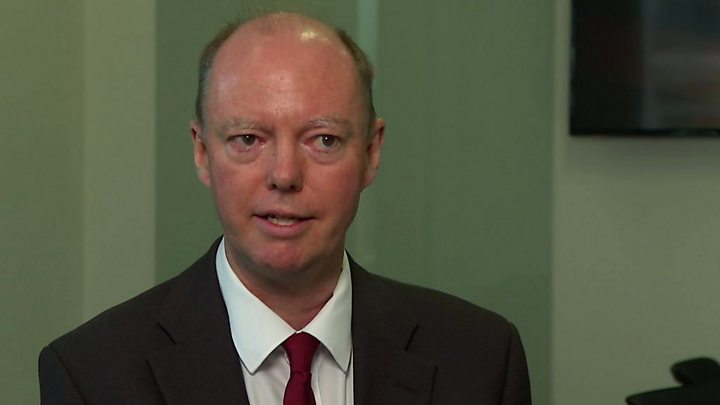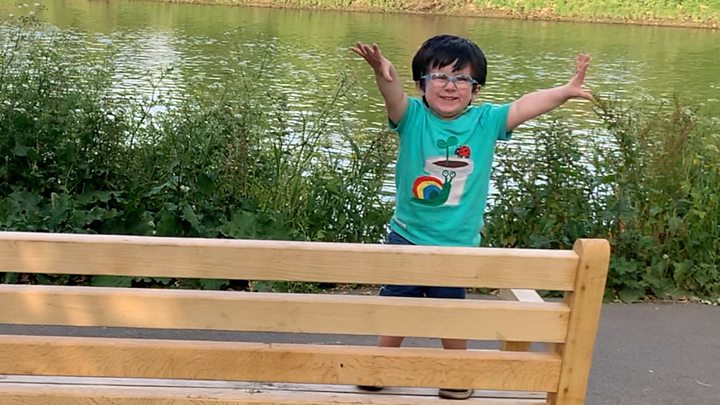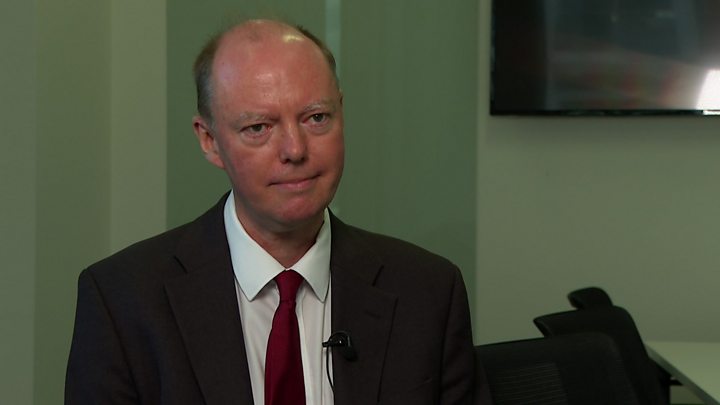
Media playback is unsupported on your device
Children are more likely to be harmed by not returning to school next month than if they catch coronavirus, the UK’s chief medical adviser says.
Prof Chris Whitty said “the chances of children dying from Covid-19 are incredibly small” – but missing lessons “damages children in the long run”.
Millions of pupils in England, Wales and Northern Ireland are due to return to school within weeks.
Prof Whitty also said Covid-19 would be a challenge for at least nine months.
He said it was unlikely there would be a vaccine in 2020 but there was a “reasonable chance” of a successful jab being ready for the following winter in 2021-22.
The government has said all pupils, in all year groups, in England will be expected to return to class full-time in September. Schools have already reopened in Scotland.
Prof Whitty, who is also England’s chief medical officer, said “many more [children] were likely to be harmed by not going than harmed by going” to school.
“There’s also very clear evidence from the UK and around the world that children much less commonly get a severe illness and end up having to be hospitalised if they get symptomatic Covid,” he added.
His interview came as chief and deputy chief medical officers for all four UK nations said there were “no risk-free options” and it was important for parents and teachers to understand both the risks and benefits as schools reopen.
Labour MP Lucy Powell told BBC Breakfast her party was concerned that the “chaos” brought on by a heavily criticised grading system for A-level and GCSE results had led schools to lose “two valuable weeks that could have been spent preparing” for the safe return to the classroom.
The shadow business minister said schools could open with greater confidence if the Department for Education provided “more clarity” for parents and teachers, improved the coronavirus contact tracing programme, and offered more widespread testing – such as to people without symptoms.
What’s the message for parents?
Prof Whitty used his interview to highlight “overwhelming” evidence that in not going to school, children are more likely to have “mental and physical ill health in the long run”.
He added that the vast majority of children who died with the virus had “very serious” pre-existing health conditions.
According to the Office for National Statistics’ latest data on ages, there were 10 deaths recorded as “due to Covid-19” among those aged 19 and under in England and Wales between March and June – and 46,725 deaths among those aged 20 and over.
Of the more than one million children who attended pre-school and primary schools in England in June, 70 children and 128 staff were infected in outbreaks of the virus, according to a Public Health England study published on Sunday.
It said most of the 30 outbreaks detected in that time had likely been caused by staff members infecting other staff or students, with only two outbreaks thought to involve students infecting other students.
The study also suggested children who went to school during June were more likely to catch coronavirus at home than at school.
Prof Chris Whitty was speaking officially on behalf of all the chief medical officers of the UK’s nations. But this rare interview reveals a lot more about his own views on how the virus is developing.
More parents going back to work with schools reopening will probably, he believes, increase virus transmission and that may require restrictions in other areas.
He says people need to accept that, with autumn and winter, the pressures will increase.
He refers to “an incredibly narrow path” to be walked to protect people from the virus without further damage to the economy, meaning there is “not very much room for manoeuvre”.
If the virus picks up among younger adults, he argues, that can spread to older and more vulnerable age groups. His conclusion is that there is a really serious challenge for at least another nine months.
This is a chief medical officer who seems unlikely to back further easing of restrictions and to be ready to propose tightening if that is the price which has to be paid for the vitally important goal of getting children back to school.
Will children spread the virus to grandparents?
Prof Whitty said it looked as if “there is much less transmission from children to adults than adults to adults”.
He said reopening schools would connect households in other ways – for example by parents meeting at school gates, or mixing with others as a result of being able to return to work.
“The fact of schools being open will probably lead to some increase in transmission but much of that is indirect,” he said.

Media playback is unsupported on your device
Are school staff at risk?
Data shows that staff spreading the virus to other members of staff is “maybe actually more important than staff members catching it from pupils”, Prof Whitty said.
He said that – much like other workplaces – “it is staff coming together and spreading it to one another” that can drive infections.
“Even with the best actions, you cannot take that [risk of transmission] down to zero and we’re really clear about that and we don’t want to pretend otherwise.”
Epidemiologist Prof Sian Griffiths told BBC Breakfast that returning school staff – and parents who can therefore go back to their workplace – should remember the “simple messages” around hygiene, such as washing hands regularly and covering sneezes.
“Some of the times when people forget about transmission are for example in the staff room, or in the work canteen or in the coffee room at work… that’s how the disease is spread in situations outside homes,” she said.
Can schools ever be completely safe?
Prof Whitty said the risks could be minimised by having hygiene and cleaning measures in place, but warned that as with any workplace, “we cannot say the risk will be taken down to zero”.
The NASUWT teachers’ union said the “critical importance” of social distancing and hygiene had been reinforced by the chief medical offic
ers’ statement.
The National Education Union accused the government of letting down pupils and teachers by lacking a “Plan B” if there is a spike in infections.
It said the government should be seeking extra space, as well as mobilising supply staff, to allow classes to continue safely if infections rise.
Education Secretary Gavin Williamson said ministers had been doing “everything we can” to help schools get ready to reopen.
Writing in the Sunday Times, he said he wanted to reassure every parent and pupil that schools “are ready for them”, and the autumn return to schools was “more important than ever” this year.
Helen Carter, deputy head teacher at Burnage Academy for Boys in Manchester, told BBC Breakfast that school would look “very different” for her pupils.
She said the school will have five separate entrances for each of its “year group bubbles”, and that children will only move to different classrooms for specific subjects such as PE and design and technology.
Ms Carter said she expected to have to persuade some parents that the site “is as secure as we can make it, and children do need to come back to school”.
“It’s been a long time, they need to re-engage with their learning – and it’s also the issue of mental health. Children need to be back in the classroom where teachers are best placed to look after them and help them make the progress they need for their learning,” she said.
Should face coverings be worn in schools?
In Scotland, where pupils returned to classrooms this month, there has been criticism from pupils and parents about safety measures and the ability to maintain social distancing.
And a school in Edinburgh has told pupils and staff to wear face coverings while moving around between lessons.
The World Health Organization has said children aged 12 and over should wear masks in line with national recommendations, citing evidence suggesting teenagers can infect others in the same way as adults.
Children’s minister Vicky Ford told Times Radio that children “should not normally need to wear face masks” at school because if they form small bubbles with other children, it is clear who their close contacts are.
“That’s very different than for example if you were on public transport or if you were out in a shopping place, where you don’t know who you are mixing with,” she said.
“In the school setting, the children and young people will be kept in their consistent groups – and that means if there was an outbreak, it can be very quickly managed.”
What about the R number and a vaccine?
The latest government estimate saw the R number – the rate at which an infected person passes on the virus to someone else – rise to 0.9-1.1, meaning infections may be growing.
On Saturday, the government said there had been 1,288 newly-confirmed cases.

Media playback is unsupported on your device
Prof Whitty said he would be “quite surprised if we had a highly effective vaccine ready for mass use in a large percentage of the population before the end of winter, certainly before this side of Christmas”.
He said while people were developing a vaccine at extraordinarily fast speed”, the virus would continue to pose a “really serious challenge” for at least the next nine months.
- How close to developing a vaccine are we?
- Short cuts and ‘dirty tricks’ in the scramble for a vaccine
- PANORAMA: Has lockdown changed what we eat?
- GOOD TROUBLE: Your new drama obsession – can these girls make it in LA?
Are you returning to school or college? Is your child or grandchild? Share your views and experiences by emailing haveyoursay@bbc.co.uk.
Please include a contact number if you are willing to speak to a BBC journalist. You can also get in touch in the following ways:
If you are reading this page and can’t see the form you will need to visit the mobile version of the BBC website to submit your question or comment or you can email us at HaveYourSay@bbc.co.uk. Please include your name, age and location with any submission.
